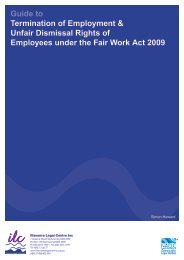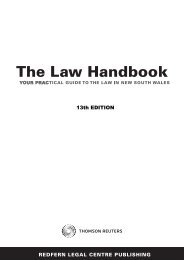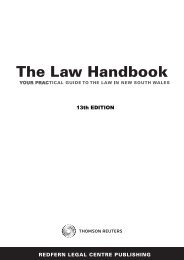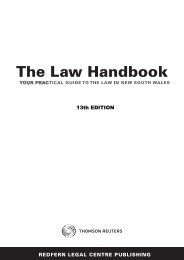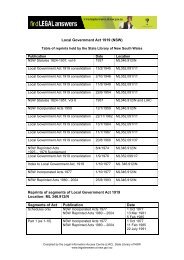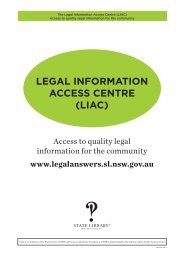The first <strong>law</strong>s restricting opium were carefully worded toapply to opium in smokable form only – not opium as itwas taken by <strong>the</strong> European population.Cannabis plants were sent to Australia by Sir JosephBanks on <strong>the</strong> First Fleet, in <strong>the</strong> hope that <strong>the</strong> new colonymight grow enough hemp to supply <strong>the</strong> British Navywith rope. Cannabis was not consumed on a large scale(although it was readily available for sale as cigarettescalled ‘Cigares de Joy’ until <strong>the</strong> 1920s). Cannabisimportation <strong>and</strong> use was prohibited by federal legislationin 1926 (implementing <strong>the</strong> 1925 Geneva Conventionon Opium <strong>and</strong> O<strong>the</strong>r <strong>Drugs</strong>), with <strong>the</strong> States adoptingsimilar prohibition in <strong>the</strong> following years.Heroin was legally available on prescription in Australiauntil 1953. It was so widely used as a painkiller <strong>and</strong> incough mixtures that Australia was <strong>the</strong> world’s largestper capita user of heroin. The 1953 prohibition of heroinwas <strong>the</strong> result of international pressure on Australia toconform to <strong>the</strong> prohibition of heroin adopted by o<strong>the</strong>rcountries, with some opposition from <strong>the</strong> AMA.Ironically, heroin, cannabis, <strong>and</strong> o<strong>the</strong>r drugs wereprohibited in Australia well before <strong>the</strong>ir use became amajor social issue.Before <strong>the</strong> 1960s, drug use was not completely unknown,but dependent drug use was typically <strong>the</strong> result of <strong>the</strong>use of opiates after first using <strong>the</strong>m for medical reasons.There were drug dependent doctors (<strong>and</strong> <strong>the</strong>ir wives),<strong>and</strong> a small bohemian subculture that used drugs. ManyAustralian arrests for drug offences involved visiting jazzmusicians.Among <strong>the</strong> significant social changes of <strong>the</strong> 1960s was<strong>the</strong> emergence of <strong>the</strong> concept of ‘recreational’ drug use– <strong>the</strong> consumption of cannabis, heroin, LSD <strong>and</strong> o<strong>the</strong>rpsychoactive drugs for pleasure, or in pursuit of spiritualenlightenment. For <strong>the</strong> first time, drug use becamewidespread – if not quite mainstream – ra<strong>the</strong>r than anactivity pursued by a few painters or poets. The officialresponse was increased <strong>law</strong> enforcement, <strong>and</strong> legislativechange to extend <strong>the</strong> range of offences <strong>and</strong> increasedpenalties for drug offences.The ‘old’ Australian drug <strong>law</strong>s were mostly under <strong>the</strong>various state Poisons Acts, reflecting an underlyingapproach of regulation <strong>and</strong> control of medicinalsubstances, with potentially addictive drugs legallyavailable only on a doctor’s prescription. The ‘new’ drug<strong>law</strong>s introduced a distinction between use <strong>and</strong> possessionoffences, <strong>and</strong> supply offences. Penalties for possession<strong>and</strong> use increased, but very substantial penalties wereintroduced for drug supply, <strong>and</strong> especially supply of largequantities (‘drug trafficking’). By 1970, all <strong>the</strong> states hadenacted <strong>law</strong>s that made drug supply a separate offence todrug use or possession offences.In 1985, <strong>the</strong> federal <strong>and</strong> state governments adopted aNational Drug Strategy which included a pragmaticmixture of prohibition <strong>and</strong> a stated objective of harmreduction. Harm reduction has been an official partof Australian drugs policy ever since, although mostresources by far are devoted to policing <strong>and</strong> border patrolattempts at interdiction (‘supply reduction’). Fewerresources are made available for health treatment <strong>and</strong>drug rehabilitation programs, or for preventative publichealth programs such as needle exchange.The needle exchange program has been successful.Australia maintains an extremely low rate of HIVinfection among injecting drug users, compared toinfection rates of 60% or more among injecting drugusers in some US cities, where needle exchange remainsillegal. The success of <strong>the</strong> needle exchange programsencouraged governments to at least consider adoptingo<strong>the</strong>r harm minimisation initiatives.image u navailableJason South, The Age (Melbourne).history of drug <strong>law</strong>s 3
The merits of a trial of a heroin prescription program,based on <strong>the</strong> Swiss model, were debated in <strong>the</strong> 1990s.The ACT government took steps to begin a trialprogram, but <strong>the</strong> Federal Government refused to allow<strong>the</strong> importation of heroin. Unable to source legitimate<strong>and</strong> controlled quality heroin, <strong>the</strong> ACT governmentab<strong>and</strong>oned <strong>the</strong> proposed trial.Australia has been tentative about allowing legal injectingrooms, with NSW <strong>the</strong> only state to permit an injectingroom, <strong>and</strong> <strong>the</strong>n only one, on a trial basis.In all states, <strong>the</strong> impact of prohibitionist <strong>law</strong>s on drugusers is somewhat modified by a number of diversionprograms, diverting some eligible users from <strong>the</strong> criminaljustice system to cautions or treatment.THe drug pOlicy debaTePublic debate over drug policy <strong>and</strong> calls for ‘drug <strong>law</strong>reform’ began in <strong>the</strong> late 1960s <strong>and</strong> has continued since.The opposition to prohibition was at first largely anargument on libertarian grounds: that people shouldhave <strong>the</strong> right to consume drugs if <strong>the</strong>y hurt nobodydoing so, positing drug offences as victimless crimes.Those arguments are still made.However, most arguments for reform today come from<strong>the</strong> harm reduction perspective. It is suggested that <strong>the</strong>legal prohibition of drugs creates crime, <strong>and</strong> makesdrug-taking more physically dangerous. Prohibitionalso requires significant public expenditure withoutpreventing significant levels of problematic drug use in<strong>the</strong> community.The primary argument against relaxation of <strong>the</strong> criminal<strong>law</strong> treatment of drugs is that it would cause drug use toincrease, <strong>and</strong> consequently lead to an increase in drugdependence. The social cost of drug use would likely riseif drugs became more freely available <strong>and</strong> more freelyconsumed. Although prohibition cannot completelyprevent drug use, <strong>the</strong> risk of being caught by <strong>the</strong> policehas a directly discouraging effect on drug users <strong>and</strong>would-be drug users. Prohibition forces drug priceshigher, indirectly discouraging drug use.It is also argued that having <strong>law</strong>s which make drug use(<strong>and</strong> supply) illegal has a symbolic effect, ‘sending amessage’ that drug use is socially undesirable.image u navailableAn ‘ice pipe’ used for smoking crystal methamphetamine. Taken 30 July 2003.Shannon Morris, The Age (Melbourne).4HOT TOPICS <strong>59</strong> > <strong>Drugs</strong> <strong>and</strong> <strong>the</strong> <strong>law</strong>





